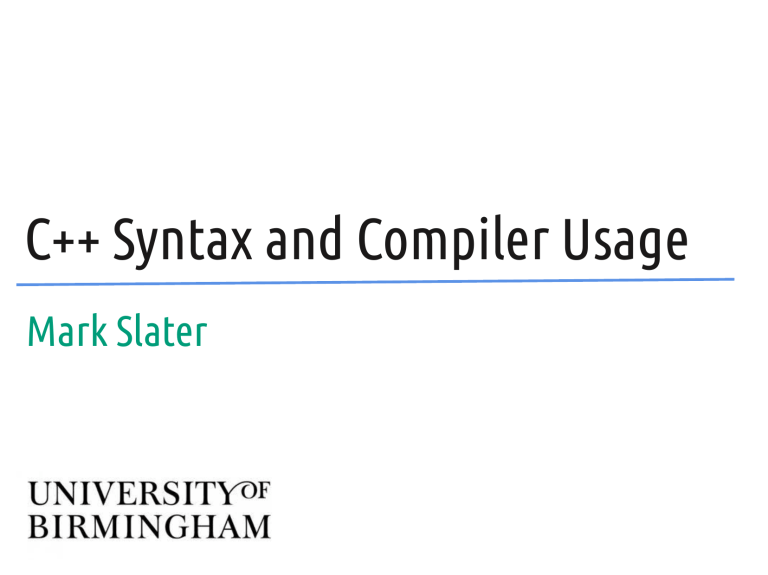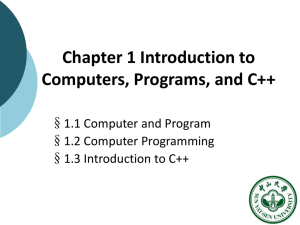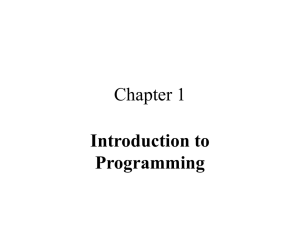C++ Syntax and Compiler Usage Mark Slater

C++ Syntax and Compiler Usage
Mark Slater
Overview
1.
Code Creation and Compilation
2.
Types, Objects, Values and Variables
3.
Operators
4.
The Compiler and Pre-Processor
What is C++?
●
●
●
C++ is a general purpose object oriented programming language widely used in the software industry and beyond. It was developed by
Bjarne Stroustrup in 1979 as an enhancement to the C language ('C with classes')
Though comprised of fairly basic syntax and conventions, it is incredibly powerful, especially with the addition of the 'standard libraries'. Anything you can think of to do on a computer can be (but not necessarily should be!) done in C++
C++ has been adopted as the standard for most coding tasks in modern Particle Physics and so it's well worth getting to know!
1. Code Creation and Compilation
Writing and Compiling Code
As already stated, C++ code can be written using any text editor, but to create the actual programs requires a compiler that creates the machinereadable code
#include <iostream> int main()
{
// Read and print three
// floating point numbers
std::cout << "Give 3 nums" << std::endl; float a{ 0 }, b{ 0 }, c{ 0 };
std::cin >> a >> b >> c;
std::cout << "You gave... " ;
std::cout << a << ", " << b << ", "
<< c << std::endl;
}
Raw Code
Compiled Code Additional Libs
Executable
The Hello World Program (Ex. 1)
To demonstrate this process, you will create the ubiquitous 'Hello World' program:
1. Go to your cloned git repository
2. Edit the file 'mpags-cipher.cpp'
3. Type in the below code and then save it
4. Run the g++ compiler
5. Execute the program!
> cd MPAGSCipher
> emacs mpags-cipher.cpp & #(or vim)
#include <iostream> int main()
{
// This is a comment
/* This is a
Multiline comment */
std::cout << “Hello World!\n”;
> g++ -std=c++11 -o mpags-cipher \ mpags-cipher.cpp
> ./mpags-cipher
Hello World!
}
>
Basic Syntax of a C/C++ Program
Before we start looking in more detail at C++ coding, we will just cover the basic syntax of program you've just written
Preprocessor directive to include other code – see later!
#include <iostream> int main()
{
// This is a comment
A function definition
- see later
/* This is a
Multiline comment */
std::cout << “Hello World!\n”;
}
It is good practise to add comments to your code – these are ignored by the compiler but help you explain what you're trying to do, both to other people and yourself a few months on!
The braces indicate blocks ('scope') of code, in this case a function
Every statement in C/C++ must be ended with a semi-colon. This is a frequent cause of compiler errors so watch out!
2. Types, Objects, Values and Variables
What are Types, Objects, Values and Variables?
C++ (and many other languages) have a defined way of holding and organising data within a computer's memory
The appropriate terms are:
➔
➔
➔
➔
Types – How to interpret data in a memory location ('object') and what operations can be performed by it
Object – Defined area of memory that holds the data ('values') associated with a type
Value – Actual data/bits in memory interpreted by the 'type'
Variable – A flag or name of an area of memory ('object')
These are a bit abstract at the moment, but we'll show examples in a few slides time!
Basic Types and Initialising Variables
We will start by introducing the basic types that are available in C++ and showing what happens when these are created and destroyed
The built-in basic types are:
➔
➔
➔
➔
➔
A boolean (true/false) – 'bool'
Integer number – 'int'
Floating point number – 'float'
Double precision number – 'double'
Single Character/0-255 number – 'char'
Note that numerical variables can also be 'signed' (default) or 'unsigned'
To declare a variable (a named object of this type), use the following syntax:
<object_type> <variable_name> {<initialisation_parameters>}
This will also create an object of the requested type (i.e. assign the appropriate memory) and initialise it with the given parameters
Aside: Other Forms of Initialisation
●
●
●
Initialisation using the braces ('{}') is termed 'Uniform Initialisation' and was introduced in C++11
There are a number of different ways of initialising variables that you'll come across but this is the recommended method
Other examples are shown below:
'a' isn't initialised. This is almost always a bad idea!
'c' is initialised properly but this can be confused with function definitions
You can also use the 'auto' keyword if it's unambiguous what type you mean – will use this more later int main()
{ int a; int b = 1 ; int c( 1 ); int d{ 1 }; auto e{ true };
}
'b' is still initialised properly but can't be used with more complex types
C++11 Uniform initialisation – the best way!
Variables in Action (1)
#include <iostream> int main()
{
int a; // BAD!!
double b = 1.2; // Not Great!
double c{3.4};
a = 43;
b = 2.2;
c = a * b;
std::cout << c << std::endl;
return 0;
}
Memory Locations (4 bytes each)
43 903 21
To show you how variables work, we'll now go over a basic program that initialises some variables, does a calculation and outputs the result
It may seem a little basic at present, but it will help you to understand how the computer interprets variables, objects, etc.
Variables in Action (2)
#include <iostream> int main()
{ int a; // BAD!!
double b = 1.2
; // Not Great!
double c{ 3.4
};
a = 43;
b = 2.2;
c = a * b;
std::cout << c << std::endl;
return 0;
}
a c b
3.4
1.2
The 3 variables are declared:
●
The markers are the variables/names of each object
●
●
The coloured outline represents the type – doubles take more space!
The grey boxes themselves are the objects
Note that for 'a', all this does is create the object,
NOT the actual value - the initial value is junk!
If b was an int, then this initialisation would only give a warning of the narrowing rather than an error
Variables in Action (3)
#include <iostream> int main()
{
int a; // BAD!!
double b = 1.2; // Not Great!
double c{3.4};
a = 43 ;
b = 2.2
; c = a * b;
std::cout << c << std::endl;
return 0;
}
a
43
c
94.6
b
2.2
We now assign values to the 3 variables
This gives the 'a' object a defined value and overwrites the others
Note that c is assigned correctly with double precision as the compiler will always use the highest accuracy type
The value of 'c' is then printed to the screen using the Standard Library
'std::cout' object as before
Variables in Action (4)
#include <iostream> int main()
{
int a; // BAD!!
double b = 1.2; // Not Great!
double c{3.4};
a = 43;
b = 2.2;
c = a * b;
std::cout << c << std::endl; return 0 ;
}
43 94.6
2.2
At the end of the program/function the following happens:
●
The return value is set to zero
●
●
The objects associated with the variables are deleted
The memory isn't reset so the values are still present
Using Strings
There is a basic type for a single character but not for a 'string' or 'array of characters'
This is because a string can be of variable length and requires much more complicated manipulation than the other types
Use the std::string type when dealing with strings. Though this looks a lot more complicated, you can generally treat it as a basic type
Note that you will need to #include the 'string' header!
Look at cppreference.com to find the headers to use for other types and functions
Initialise the string variable
'std::' is required as the string type is part of the 'std' namespace ('group')
#include <iostream>
#include <string> int main()
{
std::string msg { "Hello" };
std::cout << msg << “\n”; return 0 ;
}
Print the string as before
Constness
●
●
●
Variables are used to store any information you wish to keep available to your program, however you may not want to modify some (most!) of these
When declaring variables, it is good practise to tell the compiler if they should be kept constant or if modification is allowed
This is done by using the ' const
' keyword before the variable type
Normal non-const
(modifiable) variable can altered after initialisation int main()
{ int a{ 5 };
a = 10 ; const int b{ 5 };
b = 10 ;
} const variable cannot be modified after initialisation – the compilation will fail
A good rule of thumb is to declare everything const unless you are are certain you have to modify it!
3. Operators
Operators (1)
●
●
●
●
In addition to variable declaration, you have also now met the idea of operators
Operators are symbols that perform a specific operation on one or more objects. A subset of these are the arithmetic operations you're familiar with:
➔
➔
➔
Multiplication: a * b
Addition: a + b
Subtraction: a - b
➔
Division: a / b
For example, 'a + b' is the addition operator being applied to the objects 'a' and 'b'
Also note that operators in C++ are nothing 'special' – they are essentially shorthand for functions, e.g. 'a*b' → 'multiply(a, b)'
Operators (2)
As well as these arithmetic operators, there are several more language specific ones:
➔
➔
➔
➔
Assignment: a = b
Dec/Increment: a--, a++
Bitwise shift/stream: a << b, a >> b
Modulus: %
➔
Array: []
What each operator does is entirely a property of the type(s) they are operating on, e.g. The
'<<' operator when used on an int will bit shift it but when used on 'cout' will output the object to the screen
The syntax for this depends on the operator, but a few examples are:
<object1> <operator> <object2> (e.g. *, +, -)
<object1><operator> (e.g. [], ++)
Note that operators also have precedence, associativity (left <-> right) and arity (# of operands). For a full description, see: http://cs.smu.ca/~porter/csc/ref/cpp_operators.html
Single Character Access
As another example of simple operator use, we will look at the 'string' type
As mentioned, this type can be considered an array or list of characters
(chars) and so to access a single character from that array, you use the '[]' operator
#include <iostream>
#include <string> int main()
{
std::string msg{ "Hello World" };
// output 'Hello World'
std::cout << msg << std::endl;
// output 'o'
std::cout << msg[ 4 ] << std::endl;
}
The array operator references the zero-indexed list of letters in string and returns the appropriate element
Getting Experience with Variables (Ex. 2)
●
Now edit the code in between the braces in your previous 'Hello
World' program to do the following:
➔
➔
➔
➔
➔
➔
➔
➔
➔
Create, modify and output an integer variable
Make the variable 'const' and attempt to compile
Create a const 'double' variable and output this
Output the product of the double and int
Attempt to initialise another integer from this double
Create a bool variable using the 'auto' keyword
See what happens when you divide a double and an int and then two ints
Create and initialise a string variable
Create a single char variable (using 'auto'), assign it the value of one of the letters in your string and then output this variable.
4. The Compiler and Pre-Processor
Compiler Flags
●
●
●
As with most programs, g++/clang/intel can take a number of different command line arguments and flags that can alter the behaviour of the program
Some of the most useful ones are:
➔
➔
➔
➔
➔
➔
-std – This defines what C++ 'standard' to use. We will be using -std=c++11
-o – The filename to output to
-I – Also look in the given directory for include files
-L – Also look in the given directory for library files
-l – Link to this library (libMyLibrary.so → -lMyLibrary)
-c – This will run the compiler but NOT the linker. Used for compiling individual source files before creating an overall program
➔
➔
-save-temps – Save the intermediate files of compilation
-v – Print commands used at each stage of compilation
➔
--version – Print the version of GCC being used
You can get a full list of the flags using 'man g++'
Compiler Errors and Warnings
●
●
●
●
You have already encountered a few errors and warning during compilation
These can be the rather cryptic way of the compiler saying there's something wrong
You should always aim for your code never to produce any warnings or errors and there are some flags to the compiler to help with this:
➔
➔
➔
➔
-Wall – Enables some common warnings (NB: Not all!)
-Wextra – Even more warnings
-Werror – Turn all warnings into errors
-Wfatal-errors – Stop compilation on the first error encountered
➔
➔
-pedantic(-errors) – Issue warnings(errors) from strict ISO compliance
-Wshadow – Enable warnings for 'shadowed' variables
For this course, we will use all these flags and so our cmd line will be: g++ -Wall -Wextra -Werror -Wfatal-errors -pedantic -Wshadow ...
Preprocessor
●
●
●
Before actual compilation, the compiler goes through a 'Preprocessor' step that can be very useful for changing what code is actually compiled
The most widely used is the ' #include ' directive which you have already seen. This effectively inserts the contents of the given file at that part of the code
There are several others which can be useful for situations like cross platform development:
➔
➔
#define – Definitions can be used to replace strings in the code or used in preprocessor conditionals
#ifdef/#else/#endif – Basic conditionals that will include or exclude certain code depending on some conditions
However, these represent quite advanced use cases which we won't be dealing with




